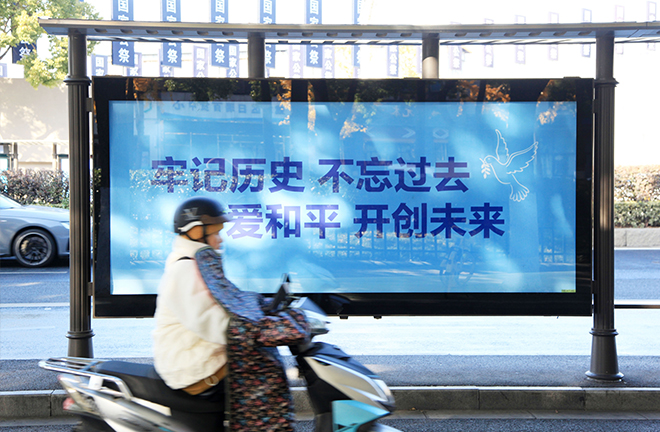Swedish academic: Actions of present decide future of humanity

Photo taken on Dec. 18, 2024, shows a slogan reading “Remember History, Keep the Past Firmly in Mind, Cherish Peace, and Create the Future” in Nanjing, Jiangsu Province. Photo: IC PHOTO
As disciplines concerned with the future well-being of humanity, both peace studies and future studies have gained increasing attention in recent years. Jan Oberg, co-founder of the Transnational Foundation for Peace and Future Research, has dedicated much of his career to the study of peace and global governance. In a recent interview with CSST, Oberg discussed peace studies, Chinese culture, and the future of humanity, stating, “Actions of the present decide the tomorrow of humankind.”
Future challenges facing humanity
Reflecting on his career, Oberg shared his long-standing involvement in “future studies,” a field pioneered by his mentor Johan Galtung. Galtung, one of the leading scholars in future studies, was deeply influenced by traditional Chinese culture in shaping his theories. Along with his wife, Fumiko Nishimura, Galtung co-authored the book Can We Learn from The Chinese People?.
Emphasizing the numerous formidable challenges humanity faces in the future, including the climate crisis, economic recession, and geopolitical conflicts, he urged, “Let’s get going with it instead of spending all our energies on the past and on foolish military affairs. War, militarism, nuclearism, imperialism, and racism have no future and do not belong, in my view, to a common future for all.”
He went on to explain that while these challenges are catastrophic, they hinder prudent and principled politics. Decisions often become helter-skelter, ill-considered knee-jerk reactions, with consequences that can boomerang back toward society and its people. It is crucial, Oberg argued, to consider “how the decision-makers will perceive our decisions and how they will react and also secure that our decisions will have a positive impact on ourselves. If decision-makers run on emotionalism, psycho-political projection, paranoia, and the sort of thing, quality thinking and decisions will fade.”
Virtues in Chinese culture
Oberg observed that the primary right is the right to survive and live—in peace, with the hope of a tomorrow, free from the threat of war. In this light, he explained that in its dedication to improving people’s well-being and sense of happiness, China has done a tremendous service to human rights while also contributing to international poverty reduction.
In Oberg’s opinion, the biggest advantage of Chinese culture is eclecticism. “With its yin-yang thinking, China has mixed things that the West has kept apart. China has learned and taken the inspiration in from other cultures. And because of the struggle for a better life, the Chinese will be able to understand other struggling people better. This has moulded China into being more curious, more open to foreign influence.”
“Today, China is regarded as the champion of human rights and peace in the future multipolar world. The Chinese people are good at constant constructive self-criticism, asking ‘How can we make things even better?.’ Humility instead of hubris is a fundamental principle of interpersonal interactions in China,” Oberg said.
During his visits since 1983 and through conversations with various Chinese people, Oberg observed a strong sense of duty—toward one another, the family, and society as a whole. This reminded him of the 35th US president John F. Kennedy’s famous statement: “Ask not what your country can do for you, ask what you can do for your country,” suggesting that citizens’ sense of duty would underpin national progress.
In response to the question of what follows consumerism and the satisfaction of material means, Oberg argued that “no matter whether we believe in Maslow’s Pyramid of Needs—or some other idea about how human beings progress to higher levels of happiness and civilization, we should remember that the materialism we can achieve by buying things from the outside is necessary, but real, true, higher-level satisfaction is non-material, spiritual, closer to wisdom, and comes from the creative vault inside human beings.”
Echoing the sentiment of British literary giant Oscar Wilde, who famously remarked that we live in a society where everyone knows the price of everything and the value of nothing, Oberg expressed being “afraid this is where Western capitalism has ended up—measuring everything in terms of market prices. In contrast, China knows avoiding the similar is a huge future task in its path toward modernization.”
Cherishing potential of Mother Earth
Oberg mentioned that he published a lengthy 132-page report, “Behind the Smokescreen,” in which he analyzed the West’s policy of containment against China and argued that it must come to an end.
He turned to a central concept in economics: opportunity cost. “What could the world get—and how many problems could it solve—if it [the United States] did not spend $2500 billion annually on armament? What could that sum buy to the benefit of all the US people? The truth is that we can neither change the past nor the present, but we can decide to change the future for the better.”
“That’s why I and my colleagues work with peace and future research. There are far too many people who deal with the past and present and with doom and gloom,” Oberg said.
In Oberg’s view, a peaceful and prosperous world is eminently possible. Echoing Gandhi’s belief, he emphasized that there is enough to meet everyone’s needs, but not everyone’s desires. Traditional approaches to security, he argued, have proven ineffective—they do not create peace, but rather cause harm.
“We should cherish the potential of our beautiful Mother Earth now, since tomorrow it may well be too late,” Oberg concluded.
Edited by CHEN MIRONG

 PRINT
PRINT CLOSE
CLOSE